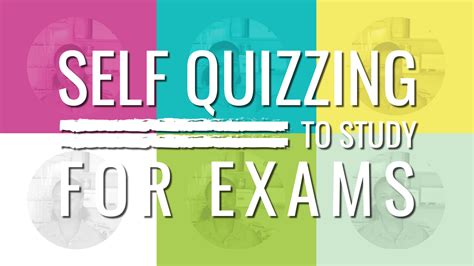Quizzing Yourself

The art of quizzing oneself is a fascinating topic that has garnered significant attention in recent years, particularly with the rise of interactive learning platforms and cognitive training tools. At its core, self-quizzing involves actively testing one’s knowledge and understanding of a subject through a series of questions, prompts, or challenges. This technique has been shown to have a profound impact on learning outcomes, memory retention, and overall cognitive function.
The Science Behind Self-Quizzing
Research in cognitive psychology has consistently demonstrated that active recall, which involves actively recalling information from memory rather than simply re-reading it, is a powerful tool for reinforcing learning and improving retention. Self-quizzing leverages this principle by providing individuals with an opportunity to engage in active recall, thereby strengthening their grasp of the material.
One of the key benefits of self-quizzing is its ability to promote spaced repetition, a learning technique that involves reviewing material at increasingly longer intervals to help solidify it in long-term memory. By incorporating self-quizzing into one’s study routine, individuals can optimize their learning schedule to maximize retention and minimize forgetting.
Practical Applications of Self-Quizzing
So, how can you incorporate self-quizzing into your daily routine? Here are a few strategies to get you started:
- Flashcards: Create physical or digital flashcards with key terms or concepts on one side and the definitions or explanations on the other. Quiz yourself by covering the answer side and trying to recall the information from memory.
- Practice Tests: Develop practice tests or quizzes that simulate the format and content of actual exams or assessments. This will help you identify areas where you need to focus your studying and build your test-taking endurance.
- Self-Questioning: As you read through study materials, ask yourself questions about the content. What are the main ideas? What are the key supporting details? How do the concepts relate to one another?
- Mind Maps and Concept Maps: Create visual representations of information to help you organize and review material. Quiz yourself by trying to recall the relationships between different concepts and ideas.
Overcoming Common Challenges
While self-quizzing can be a powerful tool for learning, it’s not without its challenges. Here are a few common obstacles you may encounter, along with some strategies for overcoming them:
- Lack of Motivation: Make self-quizzing a game or a competition with yourself. Set goals and challenges, and reward yourself for achieving milestones.
- Difficulty Creating Effective Questions: Start by identifying the key concepts and ideas in the material you’re studying. Then, ask yourself questions that require you to apply, analyze, or evaluate the information.
- Frustration with Lack of Progress: Don’t get discouraged if you don’t see immediate results. Self-quizzing is a skill that takes time and practice to develop. Be patient, and remember that the process of learning is just as important as the outcome.
Future Directions
As technology continues to evolve, we can expect to see new and innovative applications of self-quizzing emerge. From AI-powered adaptive learning platforms to virtual reality training simulations, the possibilities for interactive learning are endless.
In conclusion, self-quizzing is a versatile and effective technique for reinforcing learning, improving retention, and promoting cognitive growth. By incorporating self-quizzing into your daily routine, you can take control of your learning, overcome common challenges, and unlock your full potential.
What are the benefits of self-quizzing for learning and memory retention?
+Self-quizzing has been shown to improve learning outcomes, memory retention, and overall cognitive function by promoting active recall, spaced repetition, and the development of a deeper understanding of the material.
How can I incorporate self-quizzing into my daily routine?
+You can incorporate self-quizzing into your daily routine by using flashcards, practice tests, self-questioning, and mind maps or concept maps. The key is to find a method that works for you and to make self-quizzing a consistent part of your study routine.
What are some common challenges associated with self-quizzing, and how can I overcome them?
+Common challenges associated with self-quizzing include lack of motivation, difficulty creating effective questions, and frustration with lack of progress. To overcome these challenges, make self-quizzing a game or a competition with yourself, start by identifying key concepts and ideas, and be patient and persistent in your efforts.
As you continue on your learning journey, remember that self-quizzing is a tool that can help you achieve your goals and unlock your full potential. With persistence, creativity, and a willingness to adapt, you can harness the power of self-quizzing to take your learning to the next level.
Getting Started with Self-Quizzing: A Step-by-Step Guide

- Identify the material you want to study and set specific learning goals.
- Choose a self-quizzing method that works for you, such as flashcards, practice tests, or self-questioning.
- Develop a schedule and stick to it, incorporating self-quizzing into your daily routine.
- Track your progress and adjust your approach as needed, using the results to inform your learning strategy.
- Make self-quizzing a game or a competition with yourself, and reward yourself for achieving milestones.
By following these steps and incorporating self-quizzing into your learning routine, you can experience the many benefits of this powerful technique and achieve your full potential.
Weighing the Pros and Cons of Self-Quizzing

Pros:
- Improves learning outcomes and memory retention
- Promotes active recall and spaced repetition
- Develops a deeper understanding of the material
- Enhances cognitive function and overall learning ability
Cons:
- Can be time-consuming and require a significant investment of effort
- May not be suitable for all learning styles or preferences
- Can be frustrating or demotivating if not done correctly
Ultimately, the decision to incorporate self-quizzing into your learning routine depends on your individual needs and goals. By weighing the pros and cons and considering your own learning style and preferences, you can make an informed decision and unlock the full potential of this powerful technique.
Key Takeaways
- Self-quizzing is a versatile and effective technique for reinforcing learning and improving retention.
- It promotes active recall, spaced repetition, and the development of a deeper understanding of the material.
- Self-quizzing can be incorporated into your daily routine using a variety of methods, including flashcards, practice tests, and self-questioning.
- By making self-quizzing a consistent part of your study routine, you can experience the many benefits of this powerful technique and achieve your full potential.
As you move forward on your learning journey, remember that self-quizzing is a tool that can help you achieve your goals and unlock your full potential. With persistence, creativity, and a willingness to adapt, you can harness the power of self-quizzing to take your learning to the next level.



